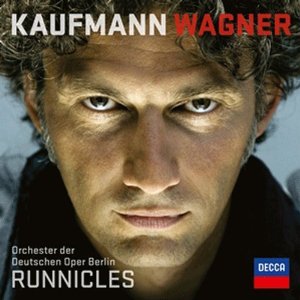|
|
|
|
|
|
|
|
|
WQXR, February 28, 2013 |
| By Marion Lignana Rosenberg |
|
|
|
Jonas Kaufmann: Wagner |
|
|
 Richard
Wagner claimed to be no friend of florid singing, and some critics maintain
that the high, elaborate music he wrote for Beckmesser in Die Meistersinger
conveys his anti-Semitic distaste for Jewish cantillation. Wagner was also a
mass of contradictions: he admired Mattia Battistini, a paragon of
Italianate mellifluousness; and he loved and imitated Vincenzo Bellini’s
music, which uses both fioritura and slow, sustained melody as vehicles for
the most piercing and exalted expression. Richard
Wagner claimed to be no friend of florid singing, and some critics maintain
that the high, elaborate music he wrote for Beckmesser in Die Meistersinger
conveys his anti-Semitic distaste for Jewish cantillation. Wagner was also a
mass of contradictions: he admired Mattia Battistini, a paragon of
Italianate mellifluousness; and he loved and imitated Vincenzo Bellini’s
music, which uses both fioritura and slow, sustained melody as vehicles for
the most piercing and exalted expression.
Though no virtuoso in the
too-many-notes nuance of the term, Jonas Kaufmann knows how to sing softly,
spin a beautiful legato line, and communicate without resorting to the
dreaded “Bayreuth bark” that surely would have horrified Wagner. There can
be a tense, throaty quality to his singing that I do not hear in such past
Wagnerians as Aureliano Pertile, Ivan Kozlovsky or Franz Völker, but the
dark splendor of his timbre and his intelligent, open-hearted way of making
music carry the day.
The prize of Kaufmann’s latest Decca recital,
“Wagner,” is the prayer from Rienzi, “Allmächtiger Vater, blick herab,”
which he begins in a rapt mezza voce and builds slowly to a ringing climax.
He sings the complete version of the Grail narrative from Lohengrin with
melting beauty and a sense of mystery (listen to the reverence with which he
lingers over eine Taube, “a dove”). And who knew that a tenor could bring
such vulnerability to the Wesendonck-Lieder (in Felix Mottl’s
orchestration)? Wagner called “Im Triebhaus” and “Träume” “studies for
Tristan und Isolde.” Dare we hope that the same holds true for Kaufmann?
The Deutsche Oper Berlin Orchestra under Donald Runnicles plays divinely
throughout “Wagner.” As for Kaufmann, if you have not done so already,
kindly drop everything and obtain tickets to see and hear him in the title
role of Wagner’s Parsifal at the Metropolitan Opera (or Live in HD at your
local cinema). You can catch Kaufmann elsewhere, but probably not in such
inspired company, because the Met Parsifal is the operatic gift of a
lifetime. François Girard’s staging is surpassingly beautiful, Kaufmann’s
fellow cast members are superb, and Daniele Gatti’s conducting is ravishing.
And wherever you see and hear Kaufmann, Max Emanuel Cencic, or Karina
Gauvin, remember: it’s never the number of notes that counts, but the beauty
and meaning that each artist creates with those notes.
|
|
|
|
|
|
|
|
|
|
|
|
|
|
|
|
|
|
|